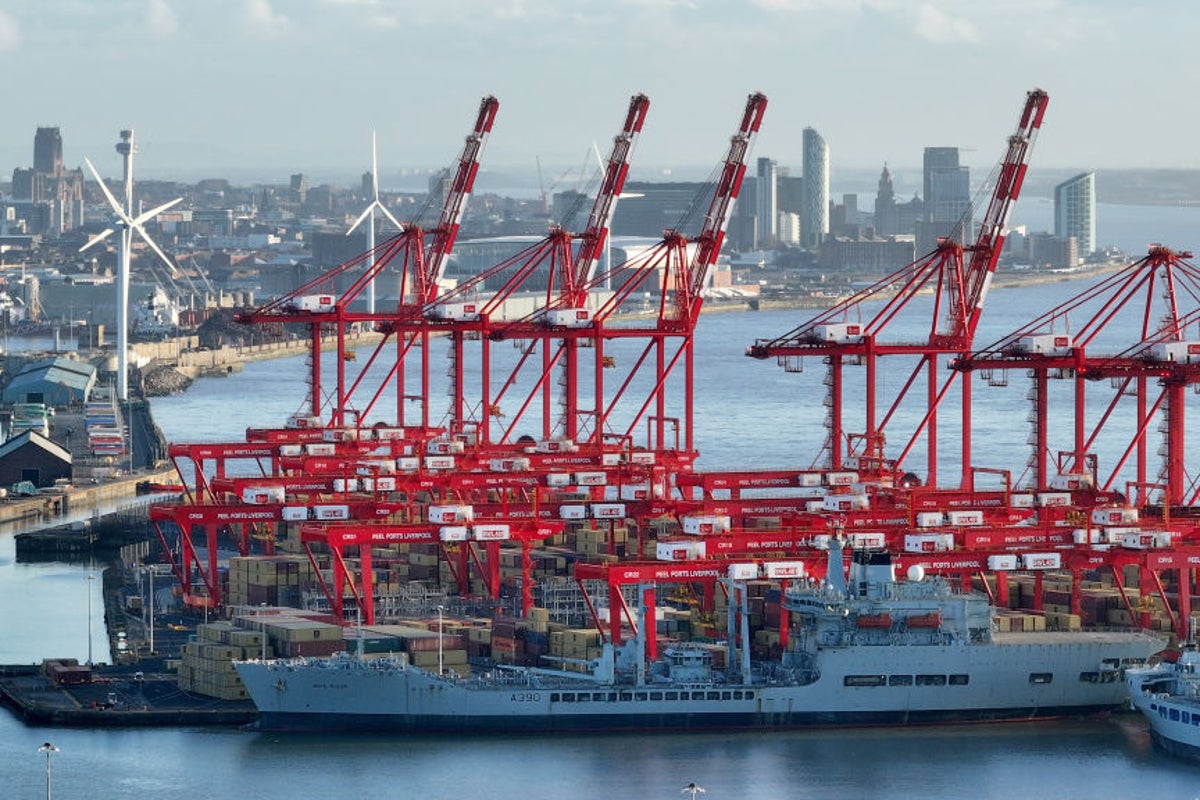Business
Business news live: FTSE 100 falls, US takes $1.3bn in tariffs from UK goods

US claims £1.3bn in tariffs from good imported from UK
The first four months since the Liberation Day tariffs were announced have seen the US raise $1.36bn (£1.01bn) through goods bought from the UK.
That cost has been paid by US buyers of imported products.
It is six times more than the value paid across the same period in 2024, reports the Times, and is more than the tariff values paid on goods from France despite the UK having a lower tariff level.
Imports from China raised most – $36bn in just four months.
One research think tank estimated $122bn in total had been collected by the US across the period, paid for by American businesses and individuals importing those goods.
Karl Matchett22 September 2025 09:49
TikTok buyers revealed by Trump
The US has been trying to strike a deal to buy TikTok from Chinese owners ByteDance for months now, with the social media app placed under a banning order before President Trump pushed it back – several times.
Now it appears a deal has crept much closer with some suggestion of an imminent report – and the names of some involved becoming clear.
Larry Ellison, Michael Dell and both Rupert and Lachlan Murdoch were name-checked by the president.
The latter two own and lead Fox corporation, while Dell is the world’s tenth richest person, CEO of the computer firm of the same name.
Ellison is second only to Elon Musk in that ranking, worth $367bn by himself – he founded and remains the largest shareholder of Oracle, as well as having a stake in Tesla.
Karl Matchett22 September 2025 09:20
Gatwick second runway shows Government ‘backing builders, not blockers’
Gatwick Airport’s £2.2 billion second runway plan could create thousands of jobs and help “kickstart the economy”, Chancellor Rachel Reeves said.
In the privately financed project, the West Sussex airport will move its emergency runway 12 metres north, enabling it to be used for departures of narrow-bodied planes such as Airbus A320s and Boeing 737s.
This will enable it to be used for about 100,000 more flights a year.
Ms Reeves said: “This Government promised to kickstart the economy – and we are.
“A second runway at Gatwick means thousands of more jobs and billions more in investment for the economy.”
Karl Matchett22 September 2025 09:00
FTSE 100 falls and US stocks set to drop too
The FTSE 100 is down 0.16 per cent this morning in a slow start to the week.
But longer-term context is important, says one expert.
“The FTSE 100 has dipped a touch this Monday morning, after a small retreat last week. Still, the index is up over 11.5% so far this year and up around 20% from its post-liberation day lows,” said Derren Nathan, head of equity research, Hargreaves Lansdown.
“However, UK stocks haven’t quite kept pace with US stock markets, which ended last week on yet another record high on hopes for a further relaxation in monetary policy over the remainder of 2025. The combination of structural value drivers from the Artificial Intelligence boom and higher than expected resilience within the global economy is helping investor confidence to keep its head above water.
“Wall Street is expected to edge down a little at the open. Markets are taking stock of guidance issued by the Trump administration over the weekend that revealed a $100,000 annual charge per employee of US workers holding an H-1B visa for skilled workers. It’s expected to apply to new applicants only, but it’s sparked some confusion amongst workers and enterprises alike.”
Karl Matchett22 September 2025 08:45
dCarbonX plan to build gas facility
A company called dCarbonX has plans to build an emergency gas storage facility, to help insulate Britain against the threat of energy blackouts.
Holding six days’ worth of gas would boost the current levels by 50 per cent, the Telegraph reports.
The UK’s current plans are for 95 per cent of energy to come from green sources but with gas reserves held for periods of volatility.
The company’s boss, Tony O’Reilly, said: “Without domestic gas storage, the UK is exposed to global gas market volatility, especially during winter.
“The question isn’t whether we need more storage, it’s whether we’re serious about building it.”
Karl Matchett22 September 2025 08:24
Business
Craft beer brewer BrewDog could be broken up as sale process begins

Beermaker BrewDog could be broken up after consultants were called in to help look for new investors.
The Scotland-based brewer, which makes craft beer such as Punk IPA and Elvis Juice, has appointed consultants AlixPartners to oversee a sale process.
Last month, BrewDog announced it was closing its distilling brands, sparking concerns for jobs at its facility in Ellon, Aberdeenshire.
The company, which was founded in 2007, said it made the decision to focus on its beer products.
No decision has been made in respect of the sale process.
A spokesperson for BrewDog said: “As with many businesses operating in a challenging economic climate and facing sustained macro headwinds, we regularly review our options with a focus on the long-term strength and sustainability of the company.
“Following a year of decisive action in 2025, which saw a focus on costs and operating efficiencies, we have appointed AlixPartners to support a structured and competitive process to evaluate the next phase of investment for the business.
“This is a deliberate and disciplined step with a focus on strengthening the long-term future of the BrewDog brand and its operations.
“BrewDog remains a global pioneer in craft beer: a world-class consumer brand, the number one independent brewer in the UK and with a highly engaged global community.
“We believe that this combination will attract substantial interest, though no final decisions have been made.
“Our breweries, bars, and venues continue to operate as normal. We will not comment on any further speculation.”
Brewdog operates 72 bars around the world as well as four breweries.
Business
‘Better to abolish RERA’: Supreme court says law helping defaulting builders

New Delhi: The Supreme Court has raised serious concerns over how real estate regulatory authorities are functioning across the country. Taking a sharp view, the top court said it may be “better to abolish” these bodies, suggesting they have failed to protect homebuyers and instead appear to benefit defaulting builders. The court added that states should reconsider the very need for such authorities if they are not serving their intended purpose.
A Bench led by Chief Justice of India Surya Kant and Justice Joymalya Bagchi said states should rethink the original purpose behind introducing RERA. The court observed that instead of protecting homebuyers, the law appears to be helping defaulting builders and not serving its intended role.
Expressing strong concern, CJI Surya Kant said states should reflect on the purpose for which RERA was created. He suggested the institution is failing to serve homebuyers and instead appears to benefit defaulting builders. “All states should now think of the people for whom the institution of RERA was created. Except facilitating builders in default, it is not doing anything else. Better to just abolish this institution,” CJI Kant said, quoted by Bar and Bench.
Last year, the High Court had stayed the state government’s decision to shift the RERA office, pointing out that the move was taken “without even identifying an alternative office location”. The court also noted that transferring 18 outsourced employees to other boards and corporations, as requested, “would render the functioning of Rera defunct”.
The Supreme Court, however, set aside the High Court’s order and allowed the state government to shift the RERA office to Dharamshala. It also permitted the relocation of the appellate tribunal to the same location. “With a view to ensure that persons affected by Rera orders are not inconvenienced, the principal appellate is also moved to Dharamshala,” the apex court said.
What Is RERA And Why It Matters
RERA, introduced in 2016, was aimed at addressing project delays, improving transparency and safeguarding homebuyers’ interests. Earlier, each state and union territory operated its own RERA website. However, in September 2025, the Ministry of Housing and Urban Affairs launched a unified RERA portal that brings together data from across states and UTs on a single platform.
Business
SEBI Proposes Overhaul Of Gold And Silver ETF Price Bands After Sharp Swings

Last Updated:
SEBI proposes stricter base price and band rules for gold, silver ETFs, including cooling-off periods after sharp global price swings to curb volatility.


Amid Global Commodity Volatility, SEBI Plans New Price Band Rules for Gold, Silver ETFs
The market regulator has sought to curb extreme volatility in gold and silver Exchange Traded Funds (ETFs) by proposing changes to the base price and price band framework. Currently, there are no separate price bands for ETFs aligned with their underlying assets, making them vulnerable to sharp price movements.
The proposal comes after sharp volatility in gold and silver ETFs triggered by fluctuations in global commodity prices. On some days, these ETFs fell by over 15%, while on others, they recorded sharp gains.
Stock exchanges currently apply a fixed price band of plus or minus 20% on the base price of ETFs, except for Overnight ETFs investing only in TREPs, which have a price band of plus or minus 5%.
Moreover, the base price for applying price bands to ETFs is taken as the T-2 day closing Net Asset Value (NAV) by exchanges, instead of the T-1 day closing NAV or price, as is the case with indices and individual stocks. This creates a challenge, as the closing NAV of ETFs typically differs between T-1 and T-2 days. Corporate actions such as bonuses and dividends are adjusted manually, increasing the risk of errors.
What Are the Key Proposals?
SEBI has proposed that the base price be determined using either the closing price of the ETF on T-1 day (weighted average price of the last 30 minutes), the closing NAV of T-1 day, or the average indicative NAV (iNAV) of the last 30 minutes of T-1 day.
Further, the regulator has proposed an initial price band of plus or minus 10% for equity and debt ETFs, which can be flexed up to plus or minus 20%. A cooling-off period of 15 minutes will apply, and up to two flexes will be allowed in a day.
For gold and silver ETFs, the regulator has proposed an initial price band of plus or minus 6%, which can be flexed up to plus or minus 20%. This will also include a 15-minute cooling-off period.
February 14, 2026, 16:08 IST
Read More
-

 Entertainment1 week ago
Entertainment1 week agoHow a factory error in China created a viral “crying horse” Lunar New Year trend
-

 Business4 days ago
Business4 days agoAye Finance IPO Day 2: GMP Remains Zero; Apply Or Not? Check Price, GMP, Financials, Recommendations
-

 Tech1 week ago
Tech1 week agoNew York Is the Latest State to Consider a Data Center Pause
-

 Tech1 week ago
Tech1 week agoNordProtect Makes ID Theft Protection a Little Easier—if You Trust That It Works
-

 Tech1 week ago
Tech1 week agoPrivate LTE/5G networks reached 6,500 deployments in 2025 | Computer Weekly
-

 Fashion4 days ago
Fashion4 days agoComment: Tariffs, capacity and timing reshape sourcing decisions
-

 Business1 week ago
Business1 week agoStock market today: Here are the top gainers and losers on NSE, BSE on February 6 – check list – The Times of India
-

 Business1 week ago
Business1 week agoMandelson’s lobbying firm cuts all ties with disgraced peer amid Epstein fallout






